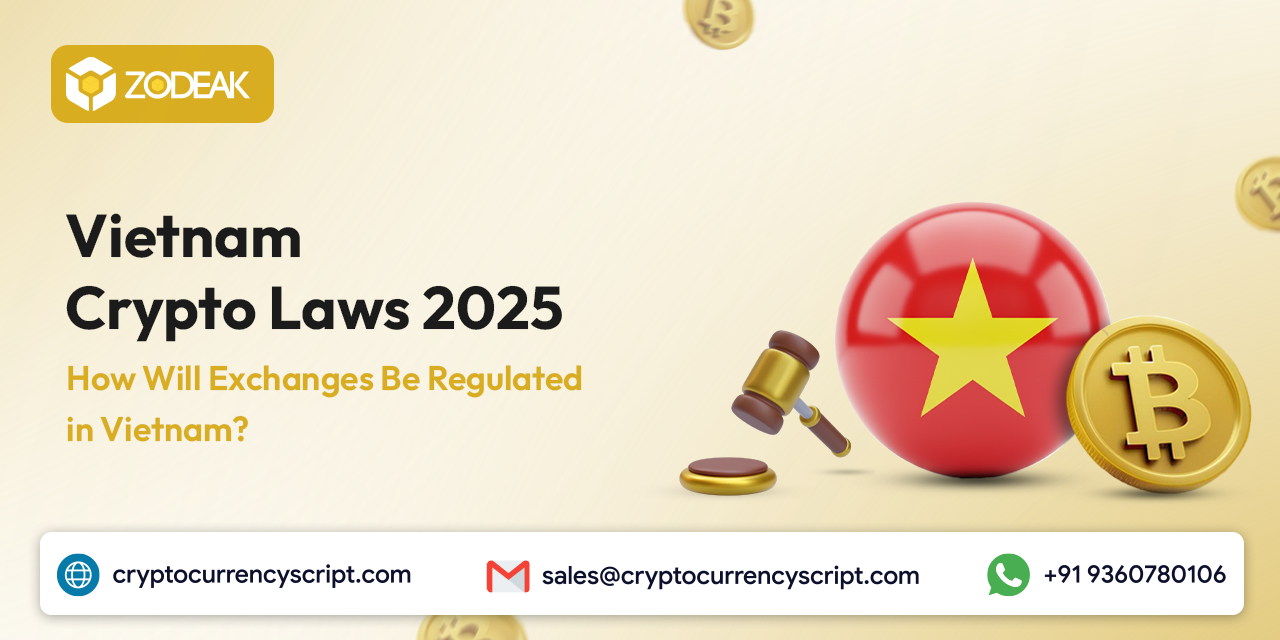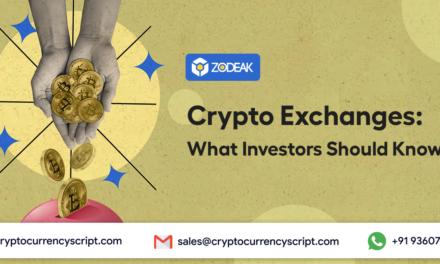Over the past few years, the Cryptocurrency market in Vietnam has experienced rapid growth. This attracts the investors, traders, and blockchain innovators. This surge of crypto adoption enables the need for regulations to ensure transparency, security, and compliance.
On June 14, 2025, Vietnam officially recognizes cryptocurrencies, NFTs, and virtual currencies. The act will take effect beginning January 1, 2026. This grant legal protection to digital assets and reshapes the landscape for innovation and investment in Vietnam.
Now is a time to investigate how Vietnam crypto laws regulate the crypto exchanges. The laws will mean for businesses and individuals who are involved in digital asset trading. This blog explores the details of crypto laws and their impact on Vietnam’s crypto system.
Key Takeaways:
- Understanding Crypto Laws: Clear regulations define how digital assets can be used, traded, and taxed, ensuring investor protection and reducing fraud.
- Crypto Taxation in 2025: Vietnam is expected to impose income and capital gains taxes on crypto transactions, aligning with global practices.
- Startup Compliance: Founders must be aware of licensing requirements, KYC/AML rules, and operational restrictions before launching a crypto venture.
- Exchange Regulation & Adoption: Exchanges will likely need government approval, and with Vietnam’s high crypto adoption rate, regulation could foster safer and more sustainable market growth.
What Are Crypto Laws and Why Do They Matter?
If you ask, Do you really need to care about crypto laws before launching an exchange platform?. The response will never change: YES!.
Crypto laws are the basic rules set by each country’s government. To guide how people can use, trade, or pay taxes with digital money. For business owners in Vietnam, these Vietnam crypto laws are very important. Since the country is still building clear policies for crypto.
Here, Bitcoin and other digital coins are treated as assets, not official money. That means you cannot use them directly for payments. But you can own, trade, and build services around them. If you plan to build an exchange or use a Clone Script, knowing these laws helps you… stay safe from penalties, build investor trust, and scale without sudden roadblocks.
Simply put, crypto laws in Vietnam are the foundation that keeps your startup stable while the market grows…
How Is Crypto Taxed in Vietnam in 2025? Key Things Startup Founders Must Know
#1 Pilot crypto market taxed like securities
Starting September 2025, Vietnam issued Resolution 05/2025/NQ-CP. Launching a five-year pilot for the crypto asset market. Since there is no full law yet, the government decided to treat crypto trades like stock trades. This means when you transfer crypto, the tax is applied on the transaction amount, just like securities…
#2 No separate capital gains tax yet for crypto profits
Vietnam still has not created a clear rule for taxing profits from buying and selling crypto. A new law on digital technology is coming into effect in 2026, but until then, gains from crypto lie within unclear boundaries.
#3 Corporate Income Tax (CIT) law changes impact crypto businesses
Law No. 67/2025/QH15 on Corporate Income Tax, effective from October 1, 2025. Brings new rules that will affect businesses, including crypto exchanges. It is designed to capture more revenue from digital and platform businesses. Which means crypto exchanges will face stricter tax treatment. Founders should plan their costs and company structure with this change in mind.
#4 Platform taxes on individuals
Starting July 2025, any digital platform that processes payments… must collect and declare taxes for individuals using that platform. If you run a crypto exchange, this could mean you will be required to handle VAT or personal income tax for your users…
#5 Legal recognition but more steps ahead
Vietnam has recognized crypto assets as legal assets starting in 2026. While this is a positive step, the actual tax rules on valuation, deductions, and reporting are still being worked out… Startups must stay flexible until the details are clear.
Do Startups Need a License for Crypto Business in Vietnam?
If you’re thinking of starting a Vietnam Crypto Exchange in 2025… the first big step is understanding the license rules. Vietnam has set up a pilot program, and every crypto business must now follow clear conditions… For startup founders, one fact stands clear: holding a license is essential
Since September 2025, Vietnam requires any company offering crypto trading. Exchange, or related services, to hold a government license. Running without approval is not allowed.
High capital and local control
To qualify, you need a very large registered capital. Nearly 10 trillion VND (around 400 million USD). On top of that, the company must be locally registered, and foreign ownership is capped. So international founders will need strong Vietnamese partners.
Skilled leadership and strong tech
The law expects founders to have qualified leaders. Your CEO must show financial or securities expertise. while your CTO and tech team must prove experience in building secure platforms. At least ten skilled engineers are required.
Transactions must use Vietnamese đồng
Licensed exchanges can only settle trades in the local currency. Any digital asset you issue must be governed with transparency, measurable, real assets, not by foreign money or securities.
Strong governance with transparency
Anti-money laundering checks, cybersecurity protections, and regular audits are not optional. Founders must build trust through full transparency and strong reporting systems.
How will exchanges be regulated in Vietnam?
Now you may wonder how exchanges will be managed in Vietnam… The answer is get a license. The government has set up a five-year pilot program, and regulations will tighten step by step. Let’s walk through the factors that matter most to entrepreneurs.
Pilot program with phases
The framework runs from 2025 to 2030. In the first two years, only a few licensed exchanges will be allowed to test their models under close monitoring. Later phases may open to more players, but only if early results prove safe. For founders, this means early compliance gives you a head start while late movers face higher entry walls.
Cross-border restrictions
Vietnam wants to keep trading locally. Licensed exchanges must prevent direct transfers to unlicensed foreign platforms. Cross-border flows will be reported and reviewed by the State Bank. If your exchange handles overseas users or partners, you’ll need strong reporting systems.
Multi-agency supervision
Oversight is not handled by one body alone. The Ministry of Finance manages licensing, the State Bank monitors payments in Vietnamese đồng, and the Ministry of Public Security checks cybersecurity. Startups must be ready to deal with three regulators at once, not just one.
Tight reporting timelines
Exchanges must send transaction data and risk reports monthly, plus quarterly compliance filings. Digital submission systems will be mandatory, so you’ll need automated reporting tools built into your exchange from day one.
Future transition plan
The pilot ends in 2030. Exchanges that meet all standards may be upgraded to permanent licenses. Those failing audits may be forced to shut down. Entrepreneurs should treat this period as a proving ground, not just temporary approval.
Crypto Adoption Rate in Vietnam: Vietnam Crypto Laws
Among the global leaders in crypto adoption, Vietnam is consistently ranked. This greatly impacts the public interest and digital economy. By the end of 2025, Vietnam’s crypto market will cross these crypto adoption milestones:
- 21.2% of Vietnam’s population either owns or uses cryptocurrency, which translates to over 20 million people.
- Globally, Vietnam ranks at the top in crypto ownership or adoption.
- As per the 2025 Chainalysis Global Crypto Adoption Index highlights, Vietnam secured 4th position.
- Demographic analysis states that the large share of crypto users is in the range 18-36, specifically, 26-36
Since the key drivers for crypto adoption in Vietnam are users aged between 18 and 36. From this, the use of blockchain technology is increasing. In parallel, the clarity in the regulations is evolving.
A high adoption rate is observed in Vietnam, which indicates the strong local demand. Also, this is positioned as a critical market for startups in Southeast Asia.
What do We Expect from Vietnam Crypto Laws?
In the next move, the Vietnamese government will issue detailed sub-decrees to clarify the specific rules on the following areas: Decentralized Finance(DeFi), stablecoins, and digital asset taxation.
Vietnam’s approach emphasizes balancing risk prevention with fostering innovative development, setting it apart from some other nations in its region.
This development is likely to draw substantial international investors and open opportunities for service providers in custody, payments, and crypto lending, enabling them to better cater to the growing demand from institutions.
Conclusion
Focusing on long-term economic development, Vietnam has a plan to create an independent financial center in order to attract the huge capital in the crypto market. As per Vietnam’s plot program, registration and licensing are needed for the crypto exchange script. Specific, local, and possible companies that meet the standards are allowed to launch a new business.
Besides business opportunities, there are challenges too. Strict regulations may deter some startups and businesses. Also, this is an opportunity, and it attracts the global crypto firms to offer new solutions.
This is not the end, and it is a new beginning for the crypto professionals in Vietnam. Let’s make one step forward by finding a reliable solution provider. Having several years of experience in the crypto market, Zodeak offers a crypto exchange platform that helps you launch a new startup that fulfills the Vietnam Crypto Laws.





